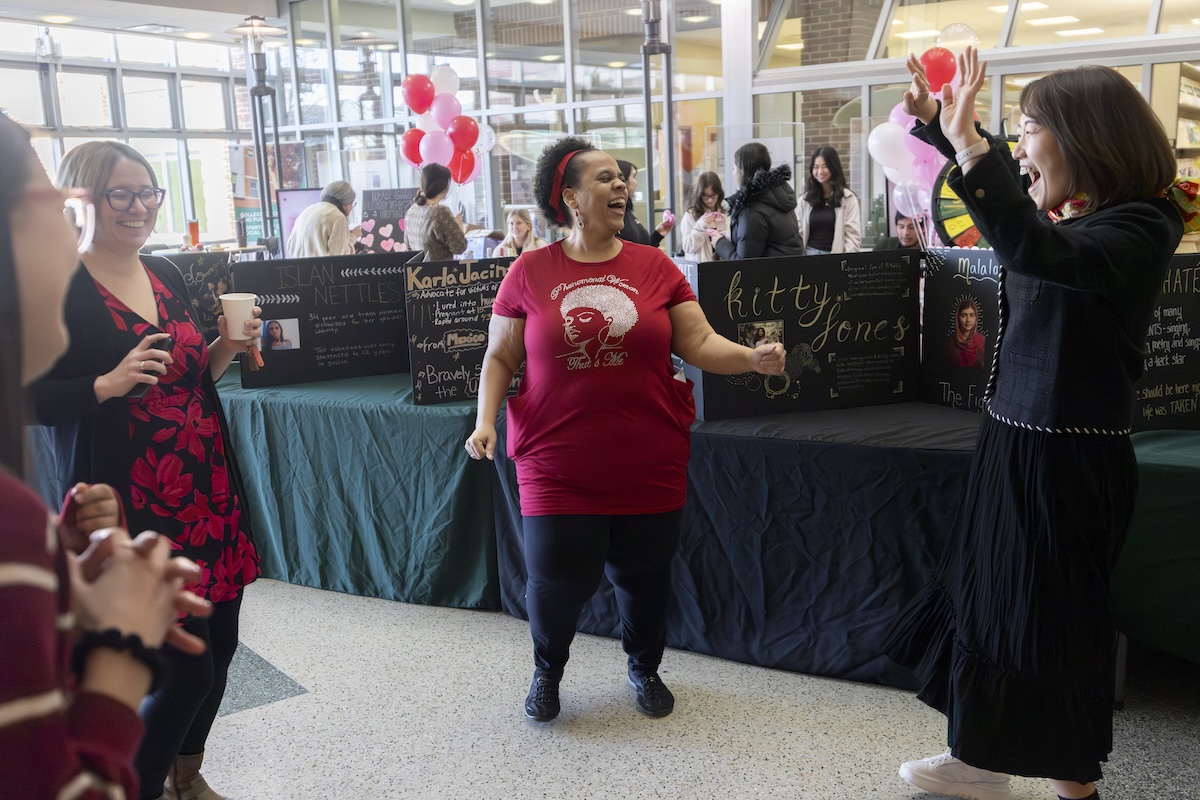One Billion Rising: Rise for Freedom event condemns sexual violence, celebrates women
Binghamton University programs offer resources and support for victims of abuse

One in three women across the planet will be beaten or raped during her lifetime. With seven billion people on the planet, that adds up to one billion women and girls.
In an effort to acknowledge this fact, Binghamton University’s Department of Social Work, in collaboration with the Institute for Justice and Well-Being, 20:1 Prevention Programs and Healthy Campus Initiatives hosted Binghamton’s inaugural “One Billion Rising” event on Wednesday, Feb. 14, in the University Downtown Center Atrium.
“My personal hope for today is that this space not only offers empowerment but also begins our journey to healing. The reality is that there are women in this space today who have already experienced physical abuse or sexual abuse,” said Monica Adams, an assistant professor of social work and one of the organizers of the event. “The burden of stigma and shame that is thrust upon women and girls has created a silence that has led to a culture where violence against women is the norm and somehow our fault.”
One Billion Rising is a yearly call to action to end violence against women. The campaign, first established on Valentine’s Day in 2012, is the biggest mass action to end violence against women — whether cisgender, transgender or those who hold fluid identities — in human history.
This year’s theme, Rise For Freedom, represented the demand for women to have the freedom to control their own bodies, minds and resources; the overall goal of the event was to “rise” with women and girls in countries across the world and to show the community what one billion people look like. Joining 1,200 art and activism events across 100 countries, It also serves to shine a light on the injustices that many — in fact, most — survivors face. One feature of the event, a “Dragon Panel,” named and told the stories of victims of sexual abuse across the world.
Laura Bronstein, director of the Institute for Justice and Well-Being and dean of the College of Community and Public Affairs, spoke at the event.
“As a university, we need to be aware of the statistics of violent abuse,” Bronstein said. “There’s a lot of work to do. If you’re a victim yourself, I hope you feel empowered to tell your story and for those who are not victims and have not experienced this, to be [conscientious] bystanders, to be friends and to be support for those affected.”
Participants in the event, many wearing red in solidarity, were invited to join in celebrating the lives of women and girls undefeated by violence. Several campus partners tabled at the event, showing their support for the cause, and provided resources to attendees. Students, staff and faculty were also invited to dance and create art, make reflections and write poems to share with the community after the event.
Kristina Marty, the senior associate dean of the college and a professor of public administration, also gave remarks.
“I’m here in a professional capacity, but I’m also here as a woman,” Marty said. “I can think of experiences in my own life where the statistics became all too real. I encourage you to share your stories, to amplify people’s voices. Being vulnerable is hard, but I think we all need to hear the message that we are not alone. And we’re not going to tolerate this — enough is enough.”
